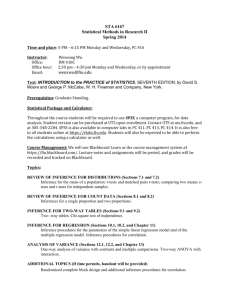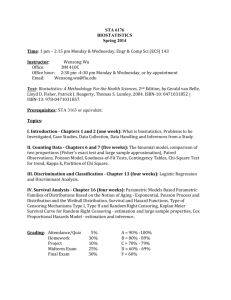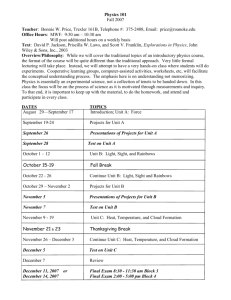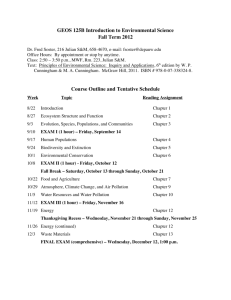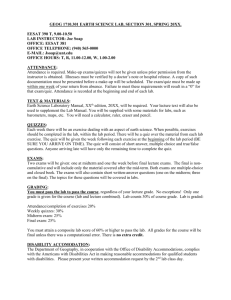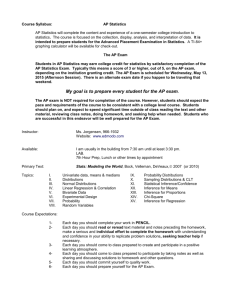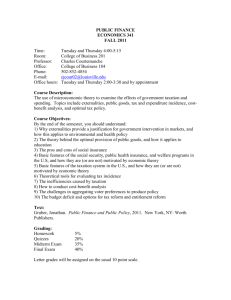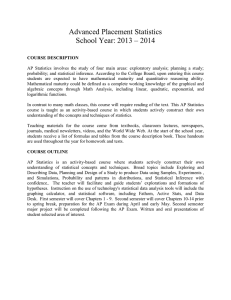Statistical Methods in Research I - FIU Faculty Websites
advertisement
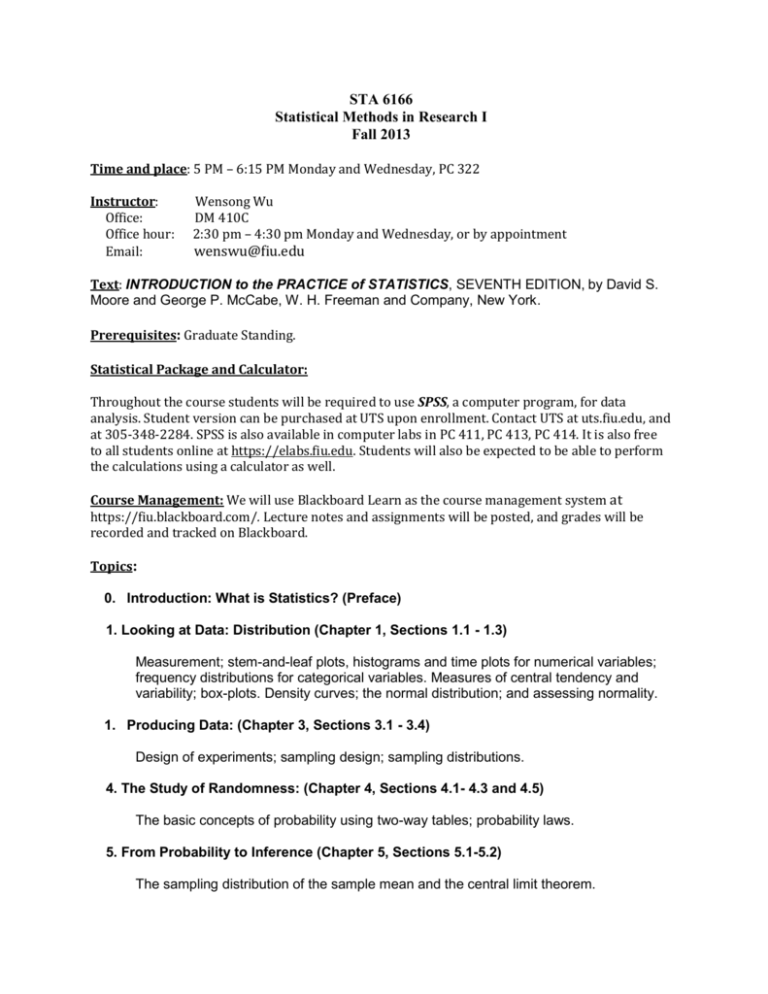
STA 6166 Statistical Methods in Research I Fall 2013 Time and place: 5 PM – 6:15 PM Monday and Wednesday, PC 322 Instructor: Office: Office hour: Email: Wensong Wu DM 410C 2:30 pm – 4:30 pm Monday and Wednesday, or by appointment wenswu@fiu.edu Text: INTRODUCTION to the PRACTICE of STATISTICS, SEVENTH EDITION, by David S. Moore and George P. McCabe, W. H. Freeman and Company, New York. Prerequisites: Graduate Standing. Statistical Package and Calculator: Throughout the course students will be required to use SPSS, a computer program, for data analysis. Student version can be purchased at UTS upon enrollment. Contact UTS at uts.fiu.edu, and at 305-348-2284. SPSS is also available in computer labs in PC 411, PC 413, PC 414. It is also free to all students online at https://elabs.fiu.edu. Students will also be expected to be able to perform the calculations using a calculator as well. Course Management: We will use Blackboard Learn as the course management system at https://fiu.blackboard.com/. Lecture notes and assignments will be posted, and grades will be recorded and tracked on Blackboard. Topics: 0. Introduction: What is Statistics? (Preface) 1. Looking at Data: Distribution (Chapter 1, Sections 1.1 - 1.3) Measurement; stem-and-leaf plots, histograms and time plots for numerical variables; frequency distributions for categorical variables. Measures of central tendency and variability; box-plots. Density curves; the normal distribution; and assessing normality. 1. Producing Data: (Chapter 3, Sections 3.1 - 3.4) Design of experiments; sampling design; sampling distributions. 4. The Study of Randomness: (Chapter 4, Sections 4.1- 4.3 and 4.5) The basic concepts of probability using two-way tables; probability laws. 5. From Probability to Inference (Chapter 5, Sections 5.1-5.2) The sampling distribution of the sample mean and the central limit theorem. 6. Introduction to Inference: (Chapter 6, Sections 6.1 - 6.3) Confidence intervals; tests of significance; uses and abuses of tests of significance. 7. Inference for Distributions: (Chapter 7, Section 7.1) Inference for the mean of a population using t-tests. 8. Inference for Count Data: (Chapter 8, Section 8.1) Inferences for a single proportion. Grading: Attendance/Quiz Homework Project Midterm Exam Final Exam 5% 30% 10% 25% 30% A = 90% -100% B = 80% - 89% C = 70% - 79% D = 60% - 69% F < 60% Attendance: You are expected to attend all classes and to arrive on time. If you miss a class, you are responsible for all material and announcements covered in class on that day. Attendance will be taken in the form of quizzes, which may occur either at the beginning or the end of lectures. Half of points of quizzes will be based on attendance, and the other half will be based on performance of the quizzes. No make-up quizzes will be considered. Homework: You are allowed to work together on homework assignments, but you need to write up the solution on your own, so that your homework does not become a copy of another. Project: You will work in groups for the project. Some possible project problems will be given, but the problems related to your own research are strongly recommended. The outcome will be evaluated through a written report and/or an oral presentation. Exams: The midterm and final exams will be both in class, close-book and close-notes. The midterm exam will be on 10/9, Wednesday, and the final exam will be on 12/9, Monday, from 5 pm to 7 pm. No make-up exams are considered unless extreme circumstances and documentation will be required. Also, you must notify me prior to the exam or the day of the exam if you think your situation merits a make-up. If you miss an exam for a valid reason but do not notify me of your situation in a timely manner, then you will receive a zero on the exam. Important Information "Florida International University is a community dedicated to generating and imparting knowledge through excellent teaching and research, the rigorous and respectful exchange of ideas, and community service. All students should respect the right of others to have an equitable opportunity to learn and honestly to demonstrate the quality of their learning. Therefore, all students are expected to adhere to a standard of academic conduct, which demonstrates respect for themselves, their fellow students, and the educational mission of the University. All students are deemed by the University to understand that if they are found responsible for academic misconduct, they will be subject to the Academic Misconduct procedures and sanctions, as outlined in the Student Handbook."
